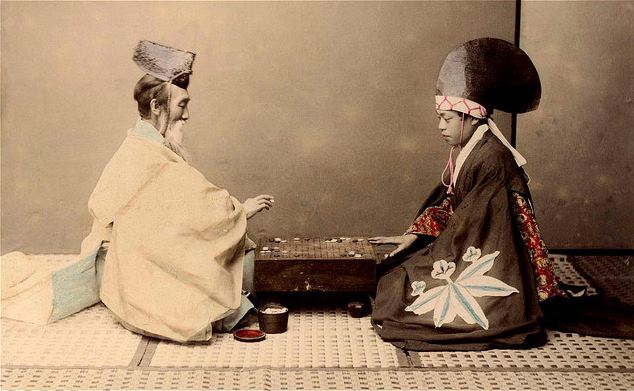Trevanian is one of the pseudonyms of Rodney William Whittaker, an author of several genres of fiction during the 1970s and 1980s. Reading Shibumi over thirty years after it was first written was an interesting experience for the fact that it seems to foretell a number of events and technologies that nowadays have more fin-de-siėcle associations.
The 1970s version of the Google Algorithm and Social Media all rolled into one is “Fat Boy”, a giant supercomputer run by the Mother Company (you need to read the novel to find out what that is): “Fat Boy contained a medley of information from all the computers in the Western World, together with a certain amount of satellite-stolen data from Eastern-bloc powers...It contained the most delicate information and the most mundane. If you lived in the industrialized West, Fat Boy had you...Programming facts into Fat Boy was the constant work of any army of mechanics and technicians, but getting useful information out of Him was a task for an artist, a person with training, touch and inspiration.”
On terrorism and geo-politics, the novel “pre-calls” 9/11, centering as it does around a plot by Islamic terrorists to down an airliner (Concorde, in this case). Some healthy torture by occupying forces. And there is a distinctly post-Cold War feel to the vested business interests, both Western and Arab, colluding to control the world’s oil supply, together with other forms of renewable energy, whilst unashamedly polluting the planet. Torture and oh yes, the demise of Concorde as a commercially viable operation is perfectly forecast.
What is Shibumi ? The term is a Japanese word, often used in the context of gardens or architecture, to connote an understated beauty. As applied to human qualities, it is harder to explain. I won’t be able to paraphrase, so I will quote the novel. Shibumi indicates a “great refinement underlying commonplace appearances...understanding rather than knowledge...modesty without pudency...in art...it is elegant simplicity, articulate brevity...in philosophy...it is spiritual tranquillity that is not passive; it is being without the angst of becoming...Authority without domination.”
Nicholai Hel, the hero of the novel, resolves to strive for Shibumi at a very young age. For those familiar with Ayn Rand, there is something of the Howard Roark in Fountainhead about Hel’s austere individualism, about striving for excellence when all around him are pushing for mediocrity.
Hel was brought up in Shanghai in the 1930s. His biological father is of German and Hapsburg stock, and his mother is a Romanov Russian, Alexandra Ivanovna, who fled the revolution and became a Shanghai socialite, and who throws out the father as she has no intention of getting married. Hel receives a classical multi-lingual artistocratic education, and his mother even allows him to become highly skilled in pure mathematics as she is told that, in the aristocratic tradition, it has no commercial value. Hel complements this by escaping during the night and hanging out with Chinese street-kids.
The Japanese invade Shanghai, and one General Takashi is billeted to take over the mansion in which Ivanovna is staying. He agrees to let her stay on, and after her sudden death, he becomes the father figure to Hel. Primarily he trains Hel in the Japanese game of Gō (“What Gō is to philosophers and warriors, chess is to accountants and merchants”). Indeed when the Second World War breaks out, Takashi sends Hel (now Nikko, not Nicholai, because of the Japanese difficulty with the ‘l’) to Japan to train in Gō with Takashi’s close friend and Seventh Dan Gō player and teacher Otake-San. Through Gō, Hel learns strategy, tactics, and the art and science of combat.
And we also get an early sense in the young Hel, of what will drive and define the older Hel: “ the egoism of a young man brought up in the knowledge that he was the last and most rarefied of a line of selective breeding that had its sources before tinkers became Henry Fords, before coin changers became Rothschilds, before merchants became Medici.” And what more vivid personification of the parasitic “merchant” class than the Anglo-Saxon West, and in particular the United States of America ? The country which also flattened Hiroshima, where the love of his life was living at the time.
Post-war Japan is brought to life through the eyes of Hel, the principal occupying forces being America and Russia. Japanese finesse, culture, art and history is rapidly Americanised, and much of its former subtleties are sacrificed. The Russians are not much better, and it is clear that the post-war years were essentially a dirty carve-up between the West and the Soviet Bloc. Hel is stateless, and has no papers. Although he manages to get some fake ones for a while, and works as a code breaker for the Americans. But eventually US-Soviet politics intervenes, and a chain of events sees him tortured and kept in solitary confinement for three years, for no particular good reason.
Fast forward to the late seventies, and Hel has a new nemesis.
By this time he has carved out a successful career as a highly paid assassin and is now in retirement at his castle deep in Basque Country. He tends to his garden and his concubine Hana (the “Dominique Francon” to Hel’s “Roark”). He has become an expert caver and spends his days exploring the deepest caverns with his close and hearty friend Beñat Le Cagot.
He is popular in the area, and is well-protected. It is surely impossible for anyone to get near his castle without everyone in every neighbouring village knowing.
The attraction of this novel is that you feel Hel to be the hero, despite his occupation. We are the product of our upbringing, and our circumstances, and it makes you realise that it is possible to forgive someone, or understand someone, if society has totally cut them out. A blond-haired man of aristocratic birth who completely absorbs Eastern philosophy.
“Your scorn for mediocrity blinds you to its vast primitive power. You stand in the glare of your own brilliance, unable to see into the dim corners of the room, to dilate your eyes and see the potential dangers of the mass, the wad of humanity...You cannot quite believe that lesser men, in whatever numbers, can really defeat you. But we are in the age of the mediocre man. He is dull, colourless, boring – but inevitably victorious...The roar of the plodders is inarticulate, but deafening. They have no brain, but they have a thousand arms to grasp and clutch at you, drag you down.”
Back to the nemesis. Well, without revealing too much, you can imagine that Fat Boy has something to do with it. In addition, there is a debt of honour Hel owes to an old Jewish friend of his, Asa Stern, that he must repay to Stern’s niece, Hannah. But those darned energy big business interests have other ideas. The denouement takes us to London, and an English country house, and then back to the Basque territory so familiar to Hel for the final showdowns.
Overall, lots to learn from this book, not least, in the tradition of Shibumi, an appetite to explore more, and get a deeper understanding of the practice of self-improvement. Namely, how in our real lives can we strive to attain the equilibrium of “casual elegance” ? For that I would recommend you read “The Shibumi Strategy” by Matthew E. May, also reviewed on this blog page, here.
The Wikipedia link to Shibumi by Trevenian is here.


 RSS Feed
RSS Feed
